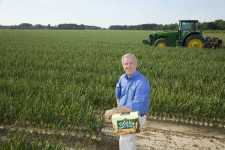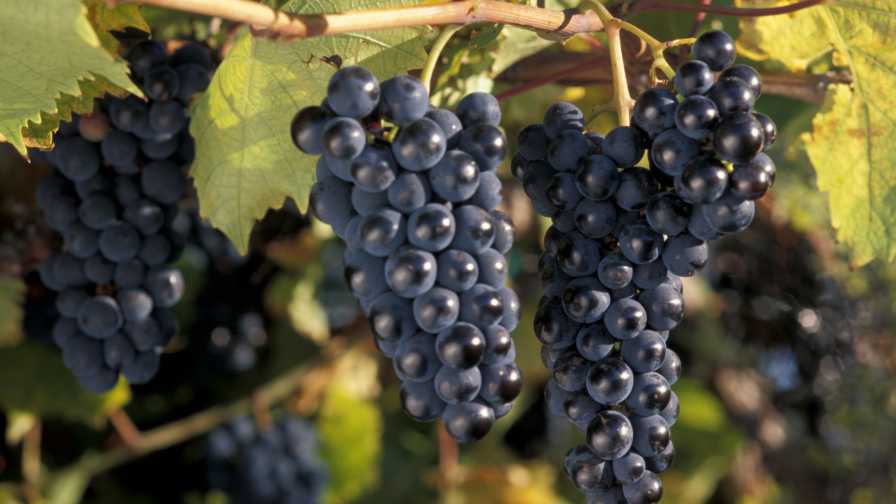Bland Farms Reaps Sweet Rewards

A lot changes in 31 years. Just ask Delbert Bland, owner of Bland Farms in Glenville, GA. With the help of his father, Bland began producing Vidalia® onions on 5 acres in 1982. In 2013, that acreage figure has swelled to more than 2,800 in Georgia alone.
In addition, he produces onions in New York and Peru, and runs a storage facility and growing operation in Texas. With all the operations, Bland Farms packs 6 million 40-pound boxes of onions a year.
That’s a lot of onions and that’s why Bland Farms is known as the Number 1 producer of Vidalias, which by definition are known as “unusually sweet onions.” Much changed over the years to propel this onion-growing giant to the production levels it enjoys today.
Onions Year-Round
With its numerous operations, Bland Farms now offers onions year-round. To help them achieve this goal, the farm has agronomists on staff that manage the crops all year in New York, Georgia, Texas, and Peru.
Bland Farms grows about five main onion varieties and has 12 available for the Vidalia district, which includes several counties in Georgia — the only state where this onion can be grown. Those counties were determined to be the only ones that the soil and climate produce the characteristics of the “sweet” Vidalia® onion.
According to Bland, onion varieties change over time so new ones are constantly being examined. “You can have an onion variety that you grew five years ago, and with breeding, that onion will become different over time,” he says. “So you are always looking for a new variety that is resistant to pink root or maybe you want to grow a flatter onion. It depends on what you are looking for to get the most yield, best taste, and best quality.”
In fact, Bland says when choosing onion varieties, his farm looks for those three traits: yield, taste, and quality.
Technology Advances
In addition to expansion and new varieties, the biggest changes in onion production, recalls Bland, have been in the area of technology and knowledge of the crop. For example, he says in the past, growers simply guessed how much fertilizer the crop needed.
“Farmers used to look at a field and if it wasn’t green enough, they would add more fertilizer to it,” he explains. “Today, the technology is such that we conduct tissue samples of the plant, do grid sampling, and then decide what the plant needs versus what we think it needs by guessing at it.”
Another area of change has been in how onions are dried and harvested. According to Bland, in the past, field workers would clip onions and place them in burlap sacks. “We felt that was the best way to do it because that was how other parts of the country did it,” he explains.
After the onions were placed in sacks and they were lying in the field, the moist ground would get the bottom of the sack wet and the sun would overheat the top, which wasn’t good for the onions, he says. Gravitating away from sacks, the farm now uses 20-bushel bins to harvest the onions, carry them into the shed, and then put into a massive dryer.
“The dryers are so critical now,” Bland says. “It is crucial that we bring in the onions and dry them instead of leaving them in the field to dry. They have to be dried in the right environment as different onions need be dried in different environments and temperatures.”
How the onions are stored also makes a difference. Bland learned that onions, in general, must be stored differently in Georgia than in other areas of the country because of weather issues. In Georgia, the onions are refrigerated and cured to 34°F and humidity is controlled to about 75%. Ozone also is used in the storage rooms to help kill any bacteria, he adds.
Bland says how they size onions has changed over the years, too. “We used to pick the big ones out and put them in one bag and the little ones would get put in another bag,” he explains. “Now we have electronic sizers where we can actually dial up a customer’s needs. If a customer wants an onion that is 3.5 to 4 inches, we can do that. If they want a smaller size, we can divide up the smaller onions into three sizes.”
The Weather Factor
One thing that remains constant, however, is Mother Nature, and she remains predictably unpredictable. This year was off to a slow start as a result of too much rain and cooler temperatures in Georgia. What occurred in some areas was the production of seed stems or “bolters” on some Vidalia® onions. According to Bland, these bolters are caused by stress, and several things can cause stress in onions, including excessive rainfall, high or low temperatures, and inadequate fertilizer applications.
“What we run into in Georgia sometimes is in the spring, we may have one day of 80-degree weather and a day or two later it might be 30 degrees,” he explains. “What happens is the onion plant grows in the 80-degree weather and then, when it gets cold, it goes dormant. When the plant decides to grow again, it comes with new life and that is the new seed or bolter that comes in the middle of it. When that seed stem comes in the middle of the onion plant, it is a hearty stalk that we can’t do anything with, so it is culled.”
Future Onion Production
Bland says he is fortunate that his two sons, Landis and Troy, are actively involved in the business. Landis is on the sales side and Troy was promoted to quality control director last summer.
“My hope is that my sons will carry on what my father and I tried to build,” says Bland. “Right now they both seem to really enjoy the operation and I guess that is the ultimate reward: to have your sons follow in your footsteps.
“The biggest challenge I try to tell them is that it doesn’t matter where you have been or where you are going,” he concludes. “You have to remember where you come from and who you are. You can sell all the onions in the world, but when all is said and done what really matters is who you love and who loves you.”
Giving Back To The Community
Delbert Bland of Bland Farms in Georgia says that he and his family have been very blessed over the years, and that is part of the reason he actively looks for people and organizations in need.
For example, the operation donates to St. Jude’s Children’s Research Hospital in Memphis, TN. The mission of the hospital, to look for cures and ways to prevent “pediatric catastrophic diseases through research and treatment,” is exactly what Bland Farms is privileged to be associated with.
“If you ever go there, your heart will be taken away,” he said of St. Jude’s. “It is truly amazing what they do for those kids.”
In addition to St. Jude’s, the operation is now involved in breast cancer awareness, and is currently running a promotion coinciding with onion sales. The end result is the company is donating to the cause.
The operation also provides two ag scholarships each year to high school students. The scholarships, says Bland, are given in honor of his father, Raymond Bland, who passed away in 2009. In fact, it was father and son who teamed up to create the operation in 1982. His father had begun his ag career in 1948.
“My father was one of the hardest working guys I had ever met,” explains Bland. “He was an expert farmer and was the backbone of the farm for years. The scholarships are in honor of him.”










